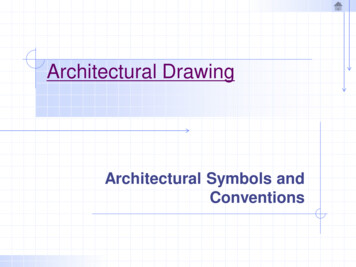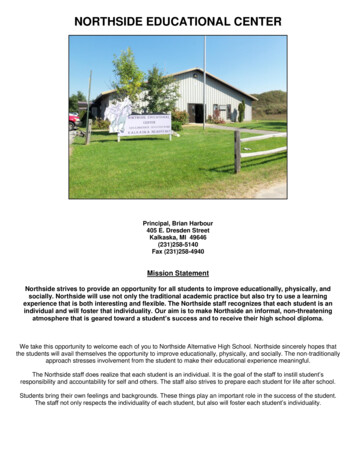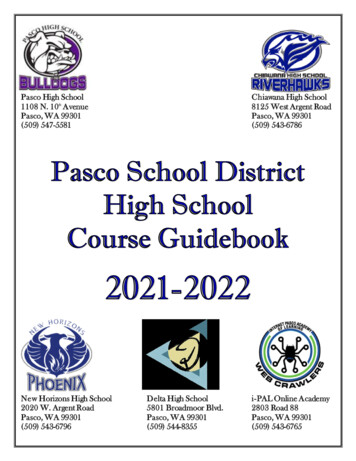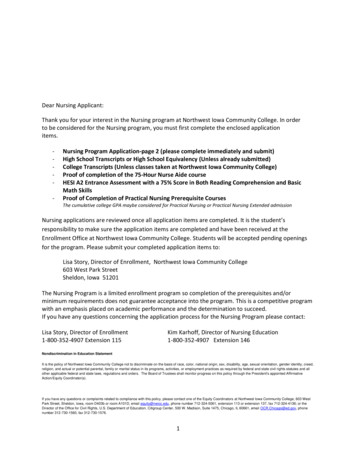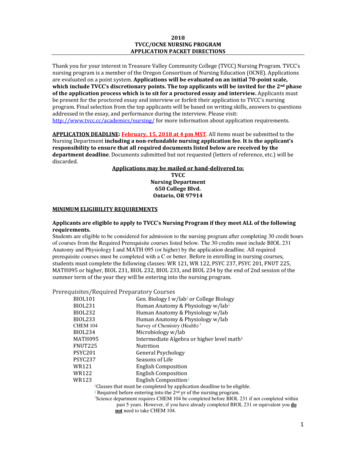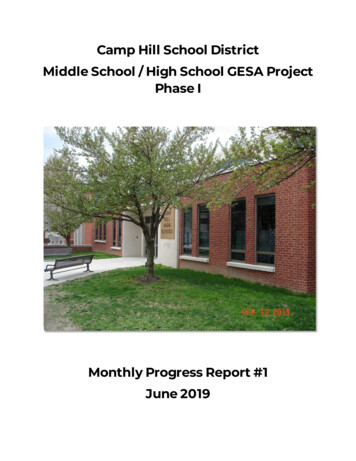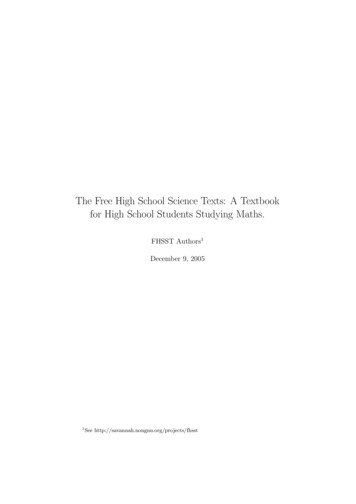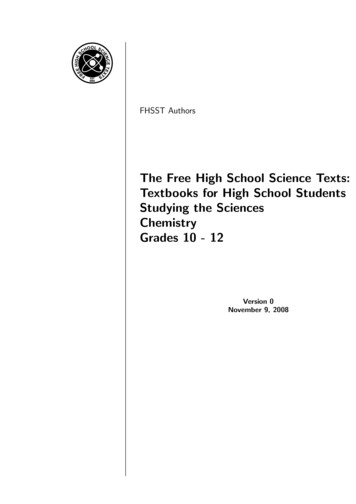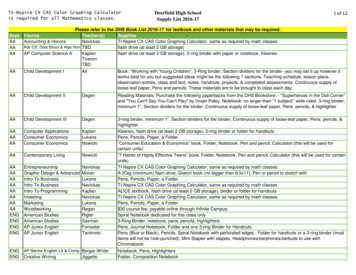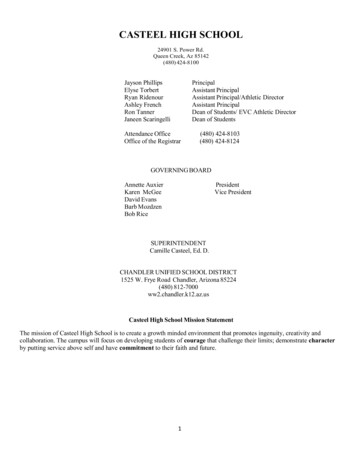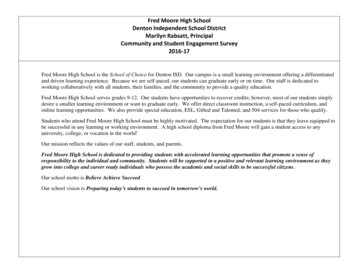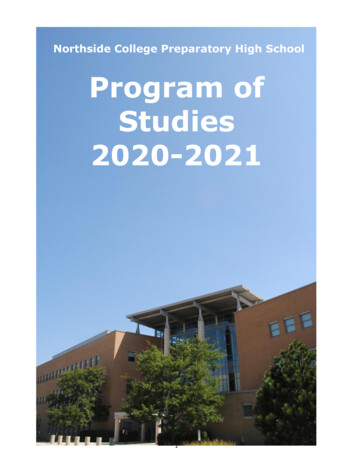
Transcription
Northside College Preparatory High SchoolProgram ofStudies2020-20211
Table of ContentsVision/Mission/BeliefsCurriculum OverviewGeneral Academic InformationEnglish DepartmentSocial Science DepartmentScience DepartmentMathematics DepartmentWorld Languages DepartmentComputer Science DepartmentFine Arts DepartmentPhysical Education DepartmentSenior ProjectsAP Capstone**denotes courses requiring approval. Please view the Northside College Prep ApprovalGuide for more information2
Northside College Preparatory High SchoolThe Mission of Northside College Preparatory High School is:To create a responsive environment that challenges all to embrace the joy of discovery, nurtures learners asthey strive to fulfill their individual and collective potential, and empowers students to pursue their roles inthe local and global communities.We value ENGAGEMENT and believe. learners thrive most when they value and relish the learning of the moment, in and for itself, notsimply as a means to a later goal.every person is a learner and a teacher who constructs meaning and understanding.reflection on both failure and success is necessary for growth.We value ETHICS and believe. ethical behavior underlies each individual’s endeavors, and self-respect is built upon achievement andintegrity.individuals enrich the democratic values and practices of the society in which they live.all must accept the challenge to share their gifts with others for the betterment of the world in whichthey live.We value CURIOSITY and believe. creative exploration and expression foster curiosity and deeper understanding.student inquiry and interests influence educational experiences in and out of the classroom.it is important to recognize experiences beyond the school walls and celebrate them as powerfuldrivers of learning.We value COLLABORATION and believe. people grow and learn through challenging themselves and collaborating with others.people share credit and take responsibility for their work.students, parents, teachers, administrators, and community leaders create and sustain a nurturinglearning environment.We value EMPATHY and believe. a meaningful education balances academic, social, and emotional needs and experiences.we all must recognize, understand, and acknowledge different perspectives and experiences and valuehow they enrich our community.in speech and action we look beyond ourselves and consider our impact on others.3
Curriculum OverviewNorthside College Preparatory High School seeks to offer its students challenging and innovative courses in all subject areas. Afundamental belief of NCP is that all students deserve an excellent program of instruction that challenges each student at thehigh level required for productive citizenship and employment.The following statements of educational philosophy shape the program of study at Northside College Preparatory High School:Content of Courses Learning is enhanced when content is placed in meaningful context and is connected to other subject areas and whenstudents are given multiple opportunities to apply what they are studying in meaningful ways. A complete and coherent curriculum must focus on the development of concepts, skills, and processes that enable allstudents to formulate, analyze, and solve problems proficiently. The entire curriculum must focus on the development of communication skills. The widespread impact of technology on nearly every aspect of our lives requires changes in the content and nature ofeducational programs.Teaching and Learning Subjects must be taught by teachers who not only have a sound knowledge of their content area but who also possessa strong understanding of how students learn. Learning is maximized when teachers focus on thinking and reasoning. Teachers guide the learning process in their classrooms and manage the classroom environment through a variety ofinstructional approaches directly tied to the content and to the students' needs. Learning is enriched through collaborative effort. Instructional approaches should be based on research about how students learn best. Students use diverse strategiesand different approaches to construct meaning: teachers recognize and take advantage of these alternativeapproaches to help students develop better understanding. The assessment of understanding in a subject area must be aligned with the content taught and must incorporatemultiple forms of assessment, including standardized tests, quizzes, research, performance tasks, investigations, andprojects.4
General Academic Information1.All courses offered at Northside College Preparatory High School are college preparatory courses. The graduationrequirements are the following:High School Graduation RequirementsRecommended College Prep Program4 English4 English3 Mathematics4 Mathematics3 Science4 Science3 Social Science3 Social Sciences2 World Language3 World Language2 Fine Arts2 Fine Arts4 Physical Education4 Physical Education3 Electives3 Electives1 Computer Science1 Computer ScienceStudent AdvisoryStudent Advisory25 Credits28 Credits2.A program of courses is developed at a conference with the student and his advisor. Final course selection will needthe approval of department chairs and the parents.3.All core courses are offered at the honors or advanced placement level.4.Each student must pass an examination on the Declaration of Independence, the flag of the United States, theConstitution of the United States and the Constitution of the State of Illinois.5.Each student must complete a six week unit in Consumer Education.6.For a more detailed description of CPS Requirements, visit the CPS Getting to the Next Grade site.*The Design for High Schools allows that advanced academics may be substituted for College Career Pathways to meet thecareer education requirements, e.g. additional language, science, mathematics, English, or Fine Arts courses.5
English DepartmentCourse DescriptionsCore CoursesHonors English I: Survey of Literature(1.0 Credit)Honors English I: Survey of Literature contains several identifiable content strands: genres within literature, writing, language,research, and oral communication. This course utilizes American, British and world literature to introduce students to variousgenres and literary terms; emphasizes writing in a variety of forms and for a variety of purposes; stresses both mastery of thefundamentals of grammar, usage, and the study of vocabulary and spelling within the context of the student's own reading andwriting; introduces research techniques and citation methods; and explores several modes of oral communication.6
Humanities(1.0 Credit)Humanities involves expanding one’s capacity for thought, sensitivity, and creativity through the study of culture, literature andthe arts. This course also emphasizes writing in a variety of forms and for a variety of purposes; stresses both mastery of thefundamentals of grammar, usage, and the study of vocabulary and spelling within the context of the student's own reading andwriting; introduces research techniques and citation methods; and explores several modes of oral communication. In preparation,all incoming students will read selected works of literature over the summer and a test on the content of these works will be partof the first quarter grade. For incoming freshmen with English I credit from a CPS Academic Center only.Honors English II: American Literature(1.0 Credit; Prerequisite: Honors English I)Honors English II: American Literature focuses on the philosophical movements, major writers, and themes of American literaturewhile developing the processes of effective reading. This course continues to emphasize writing in a variety of forms and for avariety of purposes; stresses both mastery of the fundamentals of grammar, usage, and the study of vocabulary and spellingwithin the context of the student's own reading and writing; introduces research techniques and citation methods; and exploresseveral modes of oral communication.Honors English III: British Literature(1.0 Credit; Prerequisite: Honors English II or AP English Language and Composition)Honors English III: British Literature is a survey course in literature exploring the development of modern English from its originsin the Anglo-Saxon and Renaissance periods to the modern British novel. The readings are taken from a broad spectrum of Britishhistory, as well as various genres and forms of the British canon. The process of effective reading continues and is heightenedthrough analytical, expository, and creative writing. Students will also engage in research and application of literary criticism,building toward a final thesis defense project examining critical trends and themes of the British canon.Honors English IV: World Literature(1.0 Credit; Prerequisite: Honors English III, or AP English Language and Composition, or AP English Literature and Composition)Honors English IV: World Literature is a balanced survey of literary genres in a global context. Focusing upon philosophicalmovements, major writers, and themes of world literature, students will perform the processes of effective reading. Writing,research, and oral communication skills are polished through a variety of critical and creative experiences in preparation for theexpectations of college. The course will begin with a discussion of memoir and narrative to better prepare students for the collegeapplication process.Elective Courses: Advanced Placement**AP English Language & Composition(1.0 Credit; Prerequisite: sophomore/junior/senior standing and an application process)AP English Language and Composition examines primarily non-fiction works (e.g., biographies and autobiographies, essays,journalism, social and political writing, science and nature writing) across a wide range of periods and rhetorical contexts.Students read closely in order to better understand why authors, when communicating with particular audiences, make thechoices they do. Students become skilled at writing for a variety of purposes, audiences, and occasions. This course prepares thestudent for college level reading, writing, and thinking, in addition to the Advanced Placement test in English Language andComposition.**AP English Literature & Composition(1.0 Credit; Prerequisite: AP English Language & Composition and an application process)AP English Literature and Composition is a rigorous college level course that asks students to expand, challenge, and reexaminetheir understanding of imaginative literature. Through reading critically, closely, and carefully, students deepen their awarenessof a work’s structure, style, and themes, as well as the use of figurative language, imagery, symbolism, and tone. Writingassignments concentrate on the critical analysis of literature and include expository, analytical and argumentative essays. Writinginstruction focuses on developing clear, cohesive, and persuasive written work. Finally, the class will place students in a broadcultural conversation with the world. This is a senior level course. The course prepares students for college level reading, writing,and thinking, as well as the AP examination in May.7
Elective Courses: Literature EmphasisHonors Film Studies: The Rhetoric of Cinema(1.0 Credit)Honors Film Studies is a course that engages students in becoming skilled readers of films as texts. Readings and coursework willenable students to analyze the rhetoric of cinema and look critically at the various ways films construct meaning creating bothmajor and minor ideological positions. Building upon skills from other English classes, this rigorous class will teach students tocritically discuss and write about films from various genres and time periods. They will complete several presentations and writefilm analysis and research papers.Honors Introduction to Philosophy in Literature(1.0 Credit)Honors Introduction to Philosophy in Literature students will prepare students for complex readings in nonfiction, emphasizingskills in analysis, argument, and application of philosophical arguments through speaking and listening activities as well asdifferent kinds of writing tasks. Readings range from ancient Greek to contemporary philosophers, as well as contemporaryfictional and cinematic works to discuss questions of ethics, metaphysics, epistemology. The class will culminate in a genius hourresearch task, whereby the student will choose a specific philosophical topic to present on by finding a relevant paper andargument.Honors Topics in Literature: Experimental Literature (“X-Lit”)(1.0 Credit)This course will examine a wide variety of new and evolving literary forms, genres, and sub-genres to expose students to the mostcurrent developments in literature and composition. While students already encounter a broad survey of genre in SurveyLiterature, American Literature and Advanced Placement offerings, we will examine emerging and nonstandard literary forms.Ultimately, students will have the opportunity to truly stretch their literary legs, so to speak, in exploration and analysis ofcutting-edge literature and criticism.Elective Courses: Writing EmphasisHonors Creative Writing I(1.0 Credit)In this course, students will explore writing as an art form. Students will closely study the art of writing and trace the evolution ofthe writer through the study of literature. As students read ground-breaking texts, they will attempt to find their own voices bywriting poetry, fiction, non-fiction and drama.Elective Courses: Performance EmphasisHonors Drama Literature & Performance(1.0 Credit)In this introductory course, students develop skills pertaining to several different aspects of theatre: analyzing text as a playscript, oral interpretation, acting, and directing, as well as set and costume design. Students will also explore the history of theatreand dramatic literature. The course is designed to foster growth in students of all ability levels--from novices to experiencedperformers. Students will also have the opportunity to view and critique live performances.Elective Courses: Journalism ProgramHonors Journalism I - III(1.0 Credit)Journalism I produces the school’s weekly, web-based newspaper The HoofBeat. Students will study the history of journalism andlearn how to write news, features, arts reviews, sports coverage, and editorial articles. Students will pitch story ideas, as well asaccept writing assignments from student editors. In the second semester, students showing exceptional talent, demonstratedskills, and strong work ethic may begin working as section editors. In addition, students will keep weekly news journals based ontheir analysis of professional news sites, take bi-weekly news quizzes, and learn basic photographic skills.Journalism II creates editors for the newspaper, as well as mentors to the students in Journalism I. Journalism II students buildupon the technical skills acquired the previous year, and continue to write as well as edit for their designated sections. They willbecome better familiar with Investigative journalism and long-form journalism and may create assignments in these genres. Lead8
editors are responsible for the creation and submission of the weekly edition of The HoofBeat. Routine assignments such asweekly news journals and news quizzes are continued. Students may enter competitions in journalism and attend seminarsrelated journalism.Journalism III provides additional editors for The HoofBeat, as well as mentors to the students in Journalism I and II. JournalismIII students also further build upon the technical skills acquired the previous year. Routine assignments from Journalism I andJournalism II are continued throughout Journalism III.9
Social Science DepartmentAP European HistoryAP US HistoryH Sociology/CivicsAP Human GeographyH World StudiesH Global Issues/CivicsAP MicroeconomicsH US HistoryAP Government/CivicsAP PsychologyCourse DescriptionsCore CoursesHonors World Studies(1.0 credit)This course helps students know the world and understand how it arrived at its present condition. Students learn to view theworld in various disciplines--as geographers, historians, political scientists, economists, anthropologists and sociologists. Thecourse analyzes four regions of the world—Africa, Asia, Europe and Latin America—and assesses their development from 1500CE. As an introductory freshman course, students gain basic skills in analytical thinking, writing, public speaking, group andindividual work, research and problem solving.The United States History requirement can be met with either the Honors or AP level course.Honors United States History(1.0 credit; Prerequisite: Honors World Studies)This is a survey course that provides students with an investigation of important political, economic, and social developments inAmerican history from the pre-colonial time period to the present day. Students will be engaged in activities that call upon theirskills as historians (i.e. recognizing cause and effect relationships, various forms of research, expository and persuasive writing,reading of primary and secondary sources, comparing and contrasting important ideas and events, using technology, and verbalpresentation).AP United States History(1.0 credit; Prerequisite: Honors World Studies)This course provides a challenging and unique study of United States History at the college level. Students in this course shouldexpect to spend a significant amount of time on homework and independent study. A typical week might include 40-60 pages (1-2chapters) of textbook reading in addition to other primary and secondary readings. Throughout the year, students will seeimprovement in their reading, writing, critical thinking, and analytical skills. As a result of this course, students will be preparedfor the AP examination in May.The Civics requirement can be met with either the Honors Civics course or the AP U.S. Government and Politics. HonorsCivics is a semester course that is paired with either Honors Global Issues or Honors Sociology which are semestercourses. The AP U.S. Government and Politics is a full year course.10
Honors Civics(.5 credit; Prerequisite: Honors World Studies and US History credit)This course will encourage active engagement in our community at both the local and national levels. Students will analyze howmovements have caused change in the past and how they can become part of the change they want to see. The course will explorethe design of our government and the rights provided but the focus will be more about how to be involved in creating orpromoting positive change. One of the two CPS service learning requirements will be met in this course. The course will be pairedwith a semester of either Sociology or Global Issues which are explained below.Honors Global Issues(.5 credit; Prerequisite: Honors World Studies credit and US History credit)This course may be chosen as the second half of the Civics requirement. This course challenges students to think about the worldaround them and to become agents of change. Issues of sustainability and conflict will be analyzed as well as the cultures of theworld. Each semester will rotate current topics. Current events related to several different themes will be addressed. Students willutilize problem-based learning and will have access to journalists and other experts when exploring issues.Honors Sociology(.5 credit; Prerequisite: Honors World Studies credit and US History credit)This course may be chosen as the second half of the Civics requirement. This is an integrated course that covers the main topics ofboth psychology and sociology. It will focus on the psychological study of human behavior and its relationship to sociologicaltopics. Students will develop an understanding of major core concepts of sociology, and apply these concepts to their own livesand modern day society. It will focus on the psychological study of human behavior such
Northside College Preparatory High School seeks to offer its students challenging and innovative courses in all subject areas. A fundamental belief of NCP is that all students deserve an excellent program of instruction that

